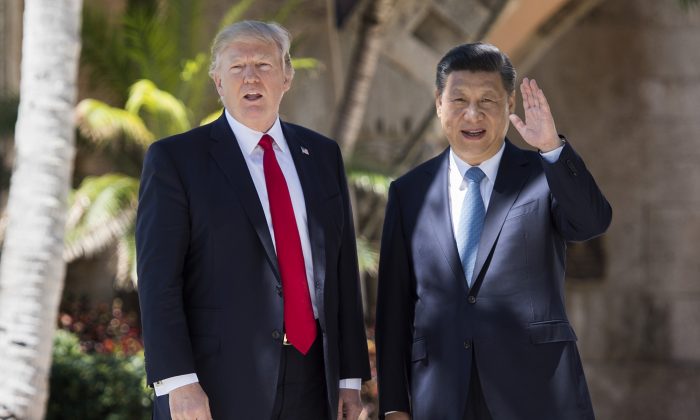
Chinese President Xi Jinping (R) waves to the press as he walks with US President Donald Trump at the Mar-a-Lago estate in West Palm Beach, Fla., on April 7, 2017. (Jim Watson/AFP/Getty Images)
Trump Is Right to Confront Revisionist China
The Trump administration implemented another round of tariffs, hitting $200 billion of Chinese goods. Predictably, Beijing cried foul and immediately pointed the finger at President Donald Trump for escalating tensions between the two countries.
Don’t be confused: China threw the first stone a long time ago. Beijing has vastly expanded its military ambitions, promoted unfair trade practices, and proactively worked to steal American technology. China is no friend. It is a great power competitor seeking global hegemony.
Previous administrations sought to develop closer ties with the communist state through economic integration and diplomatic outreach, hoping to bring China into the liberal world order. Assessing the situation today, those attempts clearly failed.
China’s “hawks” are in the driver’s seat, and the liberal-oriented moderates have been forced to the sidelines. Beijing has become a rising revisionist power, seeking to upend the U.S.-led order in Asia to one where it owns the title of hegemon.
China wishes to once again exert political and military pressure on its former, much smaller, vassal states. “China is a big country and other countries are small countries, and that’s just a fact,” stated China’s former Foreign Minister Yang Jiechi in a private meeting in 2010. Vietnam, Taiwan, Singapore, and the Philippines are all in Beijing’s line of sight.
Military prowess and economic manipulation have been the main tools used to drive this revisionist agenda. Massive man-made military fortifications with advanced radar capabilities are now spread throughout the South China Sea in what were once open waters.
Japan was forced to scramble jets 851 times to intercept Chinese fighter planes near its airspace in 2016 alone. Beijing has also developed operational anti-ship missiles to target American aircraft carriers. China recently announced its naval forces are prepared to combat U.S. forces in the Pacific.
In addition to an aggressive military posture, Beijing has declared economic war on American companies. Companies seeking to do business in China are forced to enter agreements that allow the transfer of sensitive technology and information.
Beijing deploys state-funded espionage units to steal trade secrets. And China has long supported anti-trade measures like tariffs and large corporate subsidies.
Yet this revisionism is on a collision course with the Trump administration’s foreign policy. And that’s made China queasy.
Beijing’s unease was shown early after the Trump administration stated it would increase freedom of navigation patrols in the South China Sea. A government-sponsored media outlet fired an early warning shot declaring that Trump should “prepare for a military clash.”
But the Trump administration has refused to kowtow. Peace through strength has been the overarching theme of its approach.
The president has since ordered the navigation patrols to increase in the South China Sea. Secretary Mattis also disinvited China to participate in the Rim of the Pacific military exercise. Better yet, Trump slapped sanctions on China’s defense agency and its director after Beijing violated sanctions and bought Russian fighter jets and S-400 surface to air missiles.
In an effort to boost American power, Trump has ordered a buildup of the U.S. military with a whopping $717 billion budget for 2019. U.S. naval policy has been directed to support a 355-ship navy, an ambitious goal aimed at countering Beijing’s growing fleet.
Diplomatic outreach has also been a key piece of this agenda. Mattis and Secretary of State Pompeo recently traveled to India, a natural partner against China, where they participated in the first ever 2+2 U.S.-India meeting with their respective counterparts. The outcome: a historic joint military agreement.
Ties with Japan and Australia have strengthened through economic and security coordination. Efforts to improve relations with China’s former vassal states like Vietnam are front and center. And the United States recently opened a new compound in Taiwan to help strengthen cooperation between the two countries despite loud grievances from Beijing.
Ensuring America’s business environment remains competitive with China has also been on the forefront. Trump signed the largest tax cut in history for middle-class families and businesses large and small. Burdensome red tape has been cut and America’s “energy dominance” is in full-swing, which offers leverage against China.
Don’t expect the pressure to let up soon. Trump’s confrontational strategy will stay the course. China has no right to violate international law, pillage U.S. companies, and bully its neighbors. Its revisionist agenda must be stopped.
Alex Titus is a policy adviser and fellow at America First Policies, a nonprofit organization supporting policy initiatives that will put America first. You can find him on Twitter @ATitus7.
No comments:
Post a Comment
Comments always welcome!